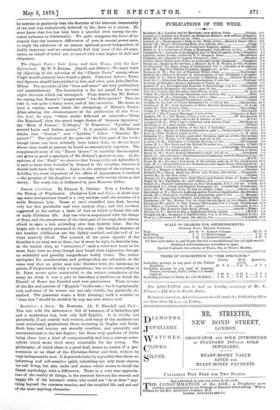- The Classic Poets : their Lives and their Tines, with
the Epic Epitomised. By W. T. Dobson. (Smith and Elder.)—We must begin by objecting to the selection of the " Classic Poets," among whom Virgil should certainly have found a place. Camoens, Ariosto, Tasso, And Spenser should have yielded to him, and even, pace John Dryden, Milton. The accounts of the "lives and times" are very perfunctory and unsatisfactory. The description is far too grand for the very slight sketches which are attempted. What reason has Mr. Dobson for saying that Homer's "proper name " was Melesigenes ? This, we -take it, was quite a fancy name, and of late invention. He seems to have a curious notion about the chronology of Milton's Poems. After relating the circumstances of the publication of the Para- dise Lost, he says, " Other works followed at intervals—' Para- dise Regained,' then the grand tragic drama of ' Samson Agonistes,' the ' Mask of Comas," L'Allegro," Il Penseroso,' Lycidas,' and several Latin and Italian poems." Is it possible that Mr. Dobson thinks that " Comus " and " Lycidas " follow " Paradise Re- gained ?" The epitomes of the epics are the best part of the book ; though these, too, have severally been better done, we do not know where they could at present be found so conveniently together. The -complicated story of the "Faerie Queen" is carefully disentangled, and gives as good a specimen of Mr. Dobson's powers as any. In the epitome of the " Iliad," we observe that Venus (why not Aphrodite ?) is said to have been wounded by Diomed in the shoulder, whereas it should have been the wrist. Again, in the account of the embassy to Achilles, the most important of the offers of Agamemnon is omitted —the promise of his daughter in marriage, with twelve cities as her dowry. The story, too, is disfigured by post Homeric fables.


































 Previous page
Previous page